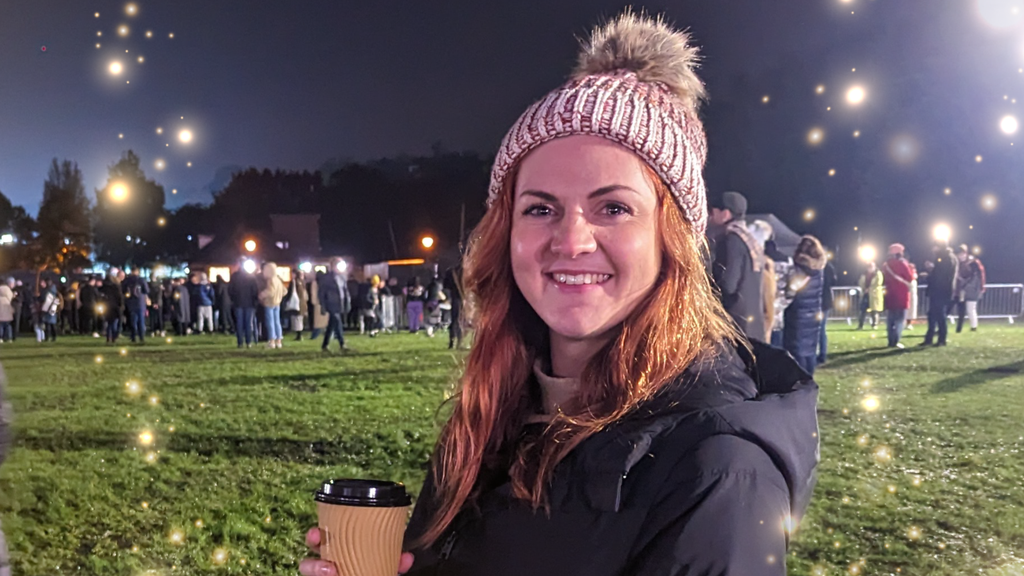
Trigger warning: reference to suicide
My name is Amelie, and I am writing to share my own story of hope with you.
I speak from my own personal experience when I say I know how tough this time of year can be for people living with, or caring for, someone with an eating disorder. The loneliness, secrecy and isolation can be so tiring, compounded by the pressures around food and family.
This is why the Beat Helpline is a lifeline for so many people, particularly at Christmas time.
At the age of 18, I realised I had a problem when I couldn’t choose a meal without crying or having a panic attack. I had left a very strict school regime and then found myself at university where my strict schedules were gone. I turned to food and exercise as things which I felt were in my control. My moods would switch constantly, I was snappy and felt a big change in myself. It might sound ridiculous, but I felt like Gollum from Lord of the Rings. I had always been a happy, bubbly person but there was something inside that made me switch. You could never guess how I would react to what somebody said to me, I was a different person. I was diagnosed with anorexia soon after.
Sitting at the dinner table with family on Christmas Day was intense. I had always loved the festive period and wanted to enjoy it, but I had so many conflictions in my head. Having an eating disorder can feel like your head is going to explode.
My behaviour became more extreme the more pressure I put on myself, although I was convinced at the time that I was okay. But I really wasn’t.
I consider myself lucky as I have a great relationship with my parents but sadly, not everyone has that support around them. This is where services like the Beat Helpline are there for people who are in distress, feeling scared and alone at Christmas, and all year round.
During my anorexia recovery, whilst trying to reintegrate into the world again, I convinced myself that I was fine but then I had moments of panic where I struggled. This developed into an intense period of disordered eating behaviours. The following Christmas I reached a new level of hatred for myself. I would buy presents for people and eat the chocolate before I could give it to anyone, and lived with the constant fear of not being able to stop myself. But anyone looking at me who didn’t know me would have no idea of how severely ill I was with my eating disorder. My family knew me as ‘this girl who’s lost all this weight’, then I looked and acted completely differently, and I thought my family will be ashamed of me.
Trying to open up to people about my binge eating was so difficult because I became much more isolated from the world. I would end up stealing my flatmate’s food, which became another source of tension as they felt I should be able to control myself better, but I couldn’t control myself.
My binge eating felt like an addiction.
It was like an out of body experience, where I was outside looking down at myself, which added an extra layer of sadness and disgust within myself. After one particularly traumatic binge, I felt so horrible that I tried to take my own life and was admitted to hospital. This terrifying wake-up call pushed me towards my recovery.
This year, I am so excited about Christmas – the music, the weather, the feeling of it. I recently got married and have a job I am really enjoying, which keeps me busy. Me and my husband are big foodies now and love to cook together, which is something I could not have imagined ever being able to do when I was ill.
I am now recovered and have volunteered my time for Beat to help other people who face eating disorders.
I have seen the immeasurable impact the Beat Helpline and support services have made on thousands of people.
For many, it’s life-changing. One thing I would tell people suffering right now is to hold on to that feeling of hope.
The Beat Helpline is there for people who need their help, in a safe and non-judgemental space. As well as being there for people with an eating disorder, Beat also supports parents, carers, friends and professionals who need someone to talk to and seek support from.
Thank you for supporting Beat.
Help us changes lives
Donate today to help us provide more vital support to people like Amelie.